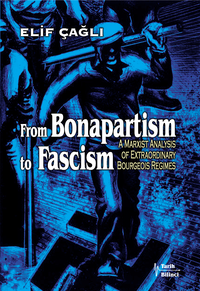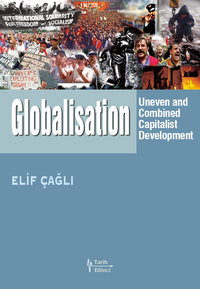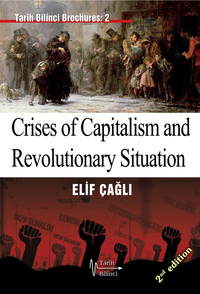It has been long since first debates among Marxists over the question of imperialism took place at the beginning of twentieth century. But traces of different tendencies and some misconceptions that emerged in these debates can be felt even today despite the fact that so many events and important transformations took place in the meantime. For instance, a great majority of colonial countries that set the background for the debates on colonialism and national independence gained their national independence and established their own nation-states. However, no ideological and political clarity has been reached within Marxist ranks over these developments which occurred especially after the Second World War. The subject has been distorted in the sense that the kind of “dependence” based on unequal relationships of the imperialist system has been identified almost with the dependence of colonies to colonialist countries.
The natural outcome of that was a conception of anti-imperialism as something different from the struggle for proletarian revolution. Those who hollow the Marxist content of anti-imperialist struggle reduced it to a kind of “national independence” struggle. Thus, a stage of “national independence” was erected in front of the working class even in those countries which, ceasing to be colonies, have founded their own states and begun developing on the basis of capitalism! The “third worldist” current reduced the struggle for socialism to a kind of “independent national development” strategy. Thus, a challenge from less-developed or medium-level capitalist countries against this or that imperialist country in order to get a better place in the table of harsh imperialist rivalry was considered as “anti-imperialism”. On the other hand, opposition of an oppressed nation’s bourgeoisie against colonialist states motivated by the desire of gaining political independence was also promoted from the level of anti-colonialism to anti-imperialism.
This is not the whole story with the distortions. Independent nation-states which took a long way along capitalist development were declared as “semi-colonies” since they were dependent on major imperialist states. Or, on the basis of the assumption that imperialism is a new colonialism, less-developed countries were described as “new colonies”. As a matter of fact, deeds of Stalinist school of falsifications are not secret. But the worst is wrong attitudes on these kinds of disputable subjects in the Trotskyist front which is expected to challenge Stalinism with correct ideas. For instance, while colonialist empires were collapsing after the Second World War, the “contributions” of Ernest Mandel and some other Trotskyists alike who were trying to re-assess contemporary features of capitalism did not serve to clarify the issues. On the contrary, they fell behind even Lenin’s analyses in many issues, creating confusion on the fundamental political tasks of the working class in the imperialist epoch. So, they adapted themselves to petit-bourgeois nationalism in the so-called third world countries and national liberation struggles in these countries led by petit-bourgeois nationalist tendencies were presented as anti-imperialist struggles, just as the Stalinists did. Moreover, some of them were presented as the realization of proletarian revolution.
Although they seem to be a matter of the past, these questions are still in front of us. Today, as it was in the past, the way of strengthening proletarian struggle for revolution lies in taking a correct Marxist position on every important question and clarifying our standpoint on that basis. Maturing of the imperialist stage of capitalism on the basis of its own characteristics laid bare that the essence of imperialist expansionism stands on not colonial monopoly, but establishing hegemony over less developed countries and areas. In the light of concrete facts we must emphasize that wars for national liberation of oppressed nations which have not political independence, so to say, their own nation state, are in fact a settling of accounts with the former colonialist period. In order to avoid a misunderstanding, we must add that national liberation struggles of the oppressed nations and colonies which have not gained their political independence yet still preserve their rightfulness as they were in the past periods. But in today’s world, “national question” is shaped directly on the basis of the characteristics of the imperialist stage of capitalism.
Pressure of powerful imperialist countries exerted on various nations, overthrow of governments in independent countries by military force, pitching of different countries against one another in regional imperialist wars, sharpening of national contradictions by imperialist forces are all burning realities of our epoch. Therefore it cannot be suggested that national question is now outdated or eliminated in the imperialist stage of capitalism. But on the other hand, we must not forget that in such cases as the Kurdish question the heart of the matter is the national independence question of the oppressed nations without their own nation state and the wars for national liberation. If we talk about national inequalities at large, oppression, injustice, conflicts, it must be emphasized from the start that national question in that sense can only be resolved by the overthrow of capitalist system.
In imperialist epoch major capitalist forces do not need to colonize weaker nations, deprive them of political independence, of their own nation states in order to be able to subjugate them. Imperialist exploitation and hegemony mechanism fits quite well with the existence of politically independent nations with their own states. Suffice to have a look at the events in the second half of 20th century. For example, national independence obtained in former colonial countries did not disrupt imperialist system of exploitation at all. Likewise, national distinctions were stoked in regional wars incited for imperialist interests and nations once living under the same nation-state were pitched against one another, not to form new colonies in the end, but new nation-states within the spheres of influence of various imperialist states.
From colonialism to imperialism
The word colony in European languages means place for settling in another country in order to tie it to the metropolitan country. And colonialism means seizing new lands, colonialist expansion. Colonization was based on open political annexation, i.e. eliminating the oppressed nation’s right of independent political and legal existence. The colonialist country gets hold of economic, political, legal, military, and every kind of executive rights on the colonized country. And that meant an absolute monopoly right of the ruling country on the ruled one. It was impossible for any other country to claim similar rights or obtain economic advantages alike on that territory unless the colony changed its master. It was through political annexation, colonization, to have rights on other countries’ economy or politics.
Under capitalism, colonization was realized particularly in geographical discoveries and conquest of overseas lands in the period of commercial capitalism (mercantilism) between 16th and 18th century. This expansion rose above seizure of rich raw material supplies of colonized countries and settling surplus population of metropolitan countries to these new lands. At the end of the period called free competition capitalism (second half of 18th century and 19th century), a transition era (1870-1900) took place in which competition led to monopolization and thus capitalism moved forward towards the imperialist stage. But between 1876 and 1900, while Germany, Italy and France were belatedly gaining new colonies in order to compete against colonialist England, world became divided up territorially.
Imperialist stage of capitalism, which began by the start of the 20th century, started a new epoch in which industrialization rose to a tremendous level and capitalism turned into a world system literally. Relatively one dimensional commercial relationships of the former period left their place to the complex relations of monopolist powers which performed astounding leaps in capital accumulation. Crashing down all barriers in front of it, finance capital began to flow into every area, region and country that seemed profitable. Unending competition between capitalist countries brought forth a re-division of lands that had already been divided on the basis of colonialism, which means imperialist wars.
Characteristics of the imperialist stage of capitalism
In the process of capitalist development, banking capital and industrial capital fused into a growing unity which meant the emergence of finance capital. Banks turned into international associations governing finance capital. As a principal characteristic of imperialist stage of capitalism, monopolies gained a decisive importance. Imperialism is a world system based on the domination of finance capital. Imperialism is not a new colonialist system, but a type of expansionism based on division and re-division of spheres of influences by international finance capital. On the basis of Lenin, we can emphasize the fundamental characteristics of imperialist stage of capitalism which started with the beginning of the 20th century: 1) capitalist monopolist associations, 2) fusion of banking and industrial capital, 3) capital exports to foreign countries, 4) that the world has already been divided up, 5) beginning of the division of spheres of influence of the world among international economic trusts.
By 20th century, the most prominent feature of capitalism came to be capital export and exported capital from developed capitalist countries accelerated capitalist development in backward countries. These former colonial countries gradually became more available for integration to capitalist market. In other words regions and countries where capital exports were concentrated did not go back compared to the former period. On the contrary, most of the old colonial countries which finance capital did not see as profitable and therefore did not invest in remained behind others. It is obvious that these explanations do not suit the interests of so-called anti-imperialist “national capitalism (!)” supporters who regard imperialism as policies of developed countries aimed to “retard” backward countries. But this is the reality: Combined and uneven development!
Imperialism is the international expansionism of finance capital, empire of finance capital. Imperialism exposed itself in its full essence particularly after the Second World War in 20th century, though all clues were given in the analysis of Marx in Capital and were subject to the assessments of revolutionaries like Lenin in the following periods. Huge capital accumulation, emerging as a result of the tendency of concentration and centralization in developed capitalist countries, reveals itself in a burning “surplus capital”. This “surplus capital” has to pass through national borders and be exported in order to find out a profitable area for investment. Main factor in its emergence is not exhaustion of possibilities of investment on a national scale, nor a saturation of domestic market to all kinds of goods. We know that the ambition of capitalists is not to satisfy the needs of the masses. The sole factor motivating capital is the desire of obtaining a higher profit rate. On this basis, capital tends to flow out to areas or countries which seem more profitable. Therefore the most distinctive feature of imperialism is the movement of a huge amount of capital among developed capitalist countries or from developed to semi or underdeveloped ones –or to some extent the reverse.
Colonialism meant usurpation of political rights, and political annexation. But the world empire of finance capital, in fact means economic annexation; establishment of hegemony over weaker countries, and, on this basis, creation of spheres of influence under imperialist powers’ control. What is essential in the imperialist epoch is the economic power of major capitalist states that enables them to subordinate even politically independent countries. Giant monopolies and financial groups, which are the distinguishing features of that epoch, compete with each other in order to penetrate this or that country’s market’ and share the cake according to their power. A young country, the USA, where capitalism developed with lightning speed, was a new power which arose not on the basis of colonialist rivalry but directly on a new basis, that is, expansionism of finance capital on a world scale.
Capitalism, having risen to the stage of imperialism, tries to overcome the contradiction between internationalization of the productive forces and nation-state form by expansionism of finance capital. Sometimes it can be more profitable for imperialists to recognise political independence of small nations. Economic annexation is achievable without political annexation and is widely practised. Under imperialist capitalist system, leaving aside some exceptions, most of the former colonial countries have gained their political independence and therefore the fact that the essential dependence is the economic one was laid bare. And this is just what world capitalist system is; there can be no isolated capitalist country without economic dependence on the system. Powerful capitalist countries make all these politically independent countries dependent on themselves through every kind of economic mechanisms. This dependence, however, is an inter-dependence on unequal terms which is inherent in the operation of capitalist system as a whole. Under capitalism it is impossible to escape from this dependence. And what is more important, it is utterly false to assert that less or medium developed capitalist countries must struggle for national liberation as the colonies and the semi-colonies did once upon a time by asserting economic dependence as an excuse.
The concept of world economy occupies a very important place in all analyses of the founders of Marxism, starting from the early but basic works like the German Ideology or the Communist Manifesto. World economy increasingly reveals itself in the imperialist stage of capitalism. Therefore, it has been a necessity to conceive all of the elements of capitalist mode of production (forces of production, relations of production, division of labour, production and division of surplus value, markets, formation of prices) not on a national scale anymore, but on an international scale. All of the concepts such as globalization, which is quite popular nowadays, indeed describe the latest phase of capitalism that has been reached in 20th century and we still live in, that is to say, the age of finance capital rule, which we simply call imperialism. At present capitalism is a world system that is realized in a single world market embracing all capitalist countries no matter big or small, including also the countries which entered the road to capitalism with the collapse of Stalinist bureaucratic regimes. It develops in an uneven but combined manner on the basis of international division of labour and reproduces the interdependence on unequal terms.
It is competition that creates monopolies. But existence of monopolies in no way eliminates competition. So, it is not right to deal scholastically with monopolies and competition as if they exclude each other. Within the dialectics of capitalist development, monopoly and competition form a unity in which these two contradict each other but also exist together. Competition creates monopoly; but the effort of overcoming competition through monopolization does not eliminate it. If we think it through for a moment, the final point that kind of movement tends to reach in its own dialectics would be a situation of an “absolute monopoly” that excludes competition. But this means a negation of relations of capitalist production based on private property. As a matter of fact, Marxist analysis of imperialist epoch indicates this course the highest stage of capitalism heads to. Centralization and concentration of capital, that is, the quantitative development of monopolization, increasingly enforces a qualitative transformation. The dimensions of monopolization and growth of socialization of production become enormous as the epoch of imperialism proceeds, which means that capitalism rapidly moves towards a point where it negates its very essence. Undoubtedly, this Marxist analysis points to the main tendency of monopolist development of capitalism, its course and the need of replacing it with communism. But capitalism will not leave its place to communism by a natural evolution. For this qualitative transformation to take place, world capitalist system must be overthrown by proletarian revolutions.
It is a necessity for capital groups which face trouble during periods of big crises to seek for some more powerful “foreign” partners, vindicating the principle that capital has no fatherland. Monopoly capitalism means monopolist marriages. And in these kinds of marriages, the important matter is not the nationality of the “bride” or “groom”, but rather economic interests. The fact that every capital group resting on a nation state in regard to their origin calls its nation state for help when they get into trouble is just a revelation of the contradictory character of capitalism in its imperialist stage. Both mergers and fights! Both the need for shelter under nation states’ wings, and mergers disregarding nationality with the efforts of overcoming restricted borders of the nation state! So, in spite of the tendency of capital to integrate, there is no abstract international capital free of national divides, flying over the clouds as if completely broken off from the states in the world. But in a contradictory process as we pointed out and as a result of multidimensional economic relations, powerful finance capital groups gain more of an international character than standing on a single nation-state.
Even if imperialist states and different capital groups are in intricate relations internationally, it is a unity in rivalry. Thus, in some periods when the rivalry becomes heated, a tendency towards arming and wars emerges in the imperialist countries. If important changes occur in existing economic balance of power and the hegemony crisis deepens, imperialist powers may have to carry on their world policy through arms in order to settle their accounts. Inseparable part of imperialist epoch is wars for hegemony. Because of capital’s need for overcoming national barriers in the imperialist epoch, monopolist competition has an international dimension. Major capitalist states compete with each other to establish their domination over sales markets, raw material markets and capital investment areas. Even if this competition is possible to carry on in a relatively peaceful manner in periods of boom, it becomes impossible in periods of big and deep crises. In such periods, struggle among imperialist states for hegemony over spheres of influence may turn into open wars for division.
Imperialist wars are nothing more than continuation by military means of the policy of rivalry among imperialists. Imperialist wars, militarism, violent methods accompanying the re-division of the world, all these are indispensable parts of the imperialist epoch. For that reason, those like Kautsky who consider imperialism as one of the policies of finance capital and disseminate the fantasy of a peaceful capitalism must be politically condemned. As proved by various regional wars reflecting the fight for hegemony among imperialist powers, a “peaceful capitalism” is still a dangerous dream today. The US case –as the hegemonic power that marked the imperialist epoch -is a clear example of aggressive expansionism of finance capital. Years under hegemony of US imperialism very clearly reveal the ways of maintaining this hegemony and making various independent states accept it. Imperialism means oppression on various nations, interfering with their internal affairs, political intrigues, political gangsterism, and, most importantly, imperialist wars. If profitable, imperialist countries instigate national distinctions, create new national questions by pitching nations against one another. Besides, in regional wars provoked by imperialist powers, territories of the countries on the target can be occupied and therefore national question may also gain and regain importance.
Correct attitude in the struggle against imperialism
Anti-imperialist struggle cannot be reduced to national liberation struggle. Now generally we have capitalist states in front of us with their own political institutions and apparatuses of bourgeois rule. The former question of “the oppressor and oppressed nation” left its place to “oppressor and oppressed class” under the capitalist state. But the question of taking a correct attitude against wars started by imperialist countries in their competition and struggle for hegemony to re-divide spheres of influence still maintains its importance. True, communists advocate national self-determination, oppose military interventions and annexations by imperialist countries. They consider oppressed nations’ struggles for political independence just and support them. But in all capitalist countries, communists’ main concern is to utilise revolutionary situations caused by war in the direction of the proletarian revolution. Struggle against military interventions of imperialist states is to be waged not with a view to promoting “national unity” (!) with the bourgeoisie or consolidating bourgeois governments, but accomplishing the social revolution.
In the face of an unjust imperialist attack, which brings forth the right to self-determination of the attacked country, the task of the revolutionary proletariat is in no way limited to recognising this right. On the contrary, the real task begins at that point. Because, even in just defensive wars in which the working masses, the majority of the nation, take upon the armed struggle to death to save the country from occupation, the bourgeoisie has only one goal: none but to protect its own order and consolidate it! This is what the ruling bourgeoisie understands from the right to self-determination, nothing more! So, the task of the revolutionary proletariat waging its struggle under these conditions is to win the leadership of the nation and pave the way for the toiling masses to determine their own destiny. Under conditions of hot war, in all capitalist countries workers must come forward to turn imperialist wars into civil wars and end bourgeois rule in their own country. In today’s world, those who are swung to a so-called anti-imperialism by saying “support the smaller bourgeoisie against bigger” in regional wars which are provoked by imperialists also disregard revolutionary situations arising in the countries under attack. And in fact what fundamentally scares all imperialist states is not a small capitalist country challenging a major one; but a proletarian revolution breaking out in any capitalist country, no matter how big it is.
A political line confining the struggle against imperialism to the recognition of national self-determination cannot go beyond bourgeois reformism. Reducing the struggle against imperialism to opposition against annexations and thus not taking sides against economic foundations of imperialism is not anti-imperialist. A struggle which starts against annexations or national oppression can gain an anti-imperialist character only when it turns into a struggle against economic foundations of imperialist system. But this change of dimension of the struggle is neither the bourgeoisie’s nor petit-bourgeoisie’s problem. It is only but only revolutionary proletariat’s problem to turn any struggle against national oppression into an anti-imperialist revolt. Anti-imperialism cannot be expected from any section of the bourgeoisie! As a matter of fact, a consistent anti-imperialism cannot be expected from the petty-bourgeoisie as well! What the petty-bourgeois democrats understand from anti-imperialist struggle is also superficial; because they overlook unbreakable ties between imperialist politics and fundamentals of the capitalist economic process. By suggesting “national capitalism” against imperialism, they spread out dreams of possibility of capitalism independent from imperialism. They are incapable of conceiving imperialism as a world system comprising indispensably all capitalist countries, or they are not willing to do so. Yet this highest stage of capitalism means nothing more than maturation of conditions of proletarian revolution and formation of the material basis for socialism. While rising to the level of a world system, capitalism indeed heads for its end.
link: Elif Çağlı, On the Question of Imperialism, 25 May 2014, https://enternasyonalizm.org/node/516
Anatomy of the Petty-Bourgeois
On Reformism






